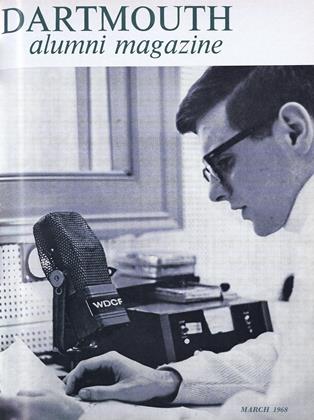President Lyndon Johnson describes the White House Fellows as young people with "their feet on the ground and eyes on the stars."
HOWARD N. NEWMAN '56 is one of them, serving a year in a kind of shadow Cabinet in a program intended to create sympathy and understanding for Government problems among tomorrow's likely leaders in other fields.
The three-year-old program, called one of the most exciting and productive innovations of the Great Society, was the brainchild of former HEW Secretary John Gardner when he was president of the Carnegie Corporation. He sought to instill creative idealism in these men 23 to 35 years old, build bridges between Government and other professions and industries, and create a pool of "inners and outers" who would come back from time to time to fill important Federal jobs.
Each of this year's sixteen Fellows has been given a job as assistant to a Cabinet member or Cabinet level officer. Newman is working at the elbow of the new Director of the Bureau of the Budget, Charles Zwick. Until recently the position of director was held by Charles Schultze, an academician who returned to teaching. Both men are Ph.D. economists.
"Part of the value of this experience is being exposed to persons of this caliber," Newman says. He admits to having considerably more respect for top-level executives than he had before knowing them. "They are only human beings, but an individual can make things happen."
His immediate boss, Director Zwick, is a member of the President's inner advisory circle and heads a 300-man department located in the executive offices adjacent to the White House. The Bureau corresponds to the management arm of the President.
Newman was nominated by his employer, Pennsylvania Hospital in Philadelphia, where he was Associate Administrator. With over 1000 other candidates he went through a tough screening process that eschews politics for talent and intelligence. He has both an MBA from Tuck '57 and an MS from Columbia's School of Public Health and Administrative Medicine, but he was considered more of a management person.
He is respectful of this opportunity to be close to the flagpole but not too overawed to pick up pragmatic points on health services. "It's forced me to see them in greater perspective—in terms of social issues. But some of my feelings have been underscored. I still believe the major initiative must come from the private sector."
Fellows are encouraged to be mobile and take advantage of the educational aspects of the program. Regardless of each man's assignment he gets exposure to policy-makers from every corner of Government - meets with legislators, top diplomats, Cabinet officers, pollsters, reporters, lawyers, professors. Recently Newman and the others dined with Rusk and met for an hour's frank discussion with the President and talked with Fulbright.
According to Newman, some of the Fellows are almost physically stretched between their desire to return to former positions when, their year ends in September or stay in Government. Though he says he sees his field differently he does plan to return to Pennsylvania Hospital and may get involved with some additional teaching and research at the Wharton School.
"In spite of all the problems - domestic, fiscal, race, international - I'm still optimistic that we can do what has to be done."
Harris & Ewing
 View Full Issue
View Full Issue
More From This Issue
-
 Feature
FeatureNew Edition of Webster Papers
March 1968 By John Hurd '21 -
 Feature
Feature"Intensive" Is the Word for It
March 1968 By Joan Hier -
 Feature
FeatureWDCR Reports
March 1968 By LAURENCE G. BARNET '68 -
 Feature
FeatureDrama Critic
March 1968 -
 Feature
FeatureDiscount Dynamo
March 1968 By MARIE WHITE -
 Article
ArticleEvariste Galois: A Study in Genius
March 1968 By REESE T. PROSSER,
Features
-
 Feature
FeatureAbout Students
April 1975 -
 Feature
FeatureNext Month: A (Not Altogether) New Look
June • 1988 -
 Feature
Feature"The Computer Revolution" Revisited
OCTOBER 1984 By George O'Connell -
 Feature
FeaturePublic Interest an The Technological Revolution
February 1955 By LLOYD V. BERKNER -
 Feature
FeatureO Julie!
Sept/Oct 2003 By MEG SOMMERFELD ’90 -
 Feature
Feature"Our trusty and well-beloved John Wentworth Esq., Governor"
DECEMBER 1968 By Susan Liddicoat

